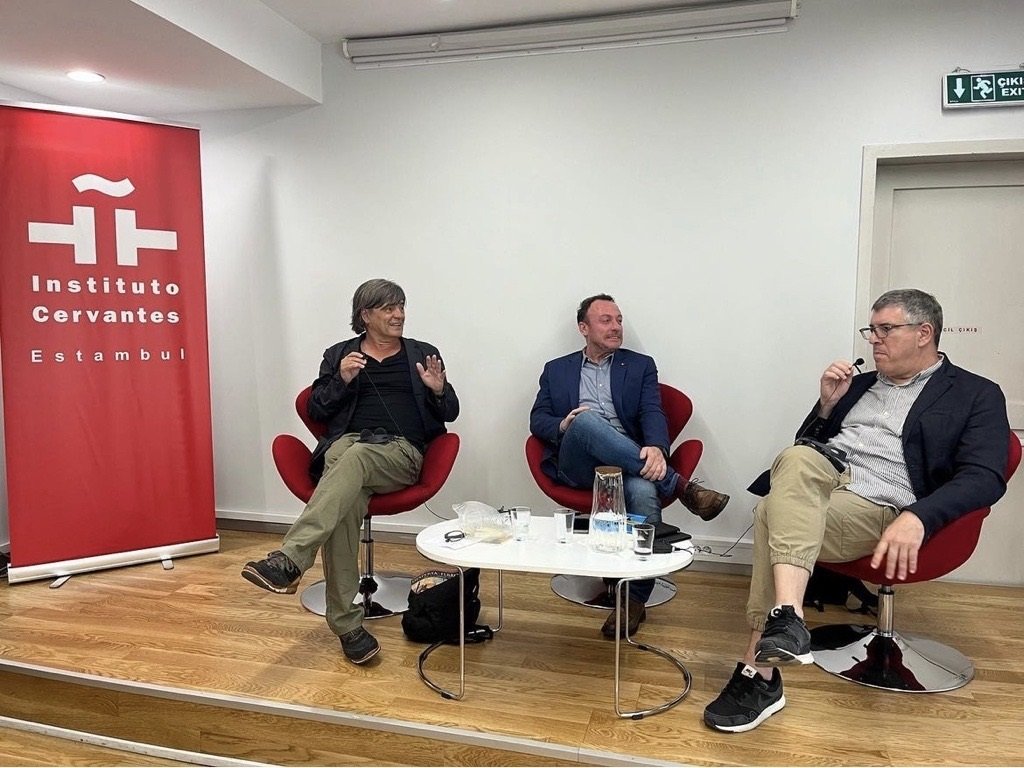© Turkuvaz Haberleşme ve Yayıncılık 2024
Typically, journalists are responsible for writing the news, but in this particular instance, our news revolves around a group of journalists.
The Istanbul Cervantes Institute continues its cultural mission through various events. It recently hosted Jacinto Anton, Guillermo Altares from El Pais, one of Spain's largest newspapers, for an engaging cultural conversation. The event was organized by the Embassy of Spain in Istanbul with the collaboration Cervantes Institute.
The event, attended by Javier Hergueta, the ambassador of Spain to Ankara, provided a platform for the journalists to share their experiences in cultural journalism. They discussed the significance of journalism, culture, history, adventure and life and emphasized that "what is done with memories is more important than mere recollection."
At the beginning of the session, Jacinto Anton showcased a collection of objects he carries in his bag, including a fragment from an Egyptian mummy, a handful of soil from Tutankhamun's tomb, a mammoth feather and a snakeskin. The intriguing nature of these items would undoubtedly have caught the attention of airport security during the X-ray screening. However, for Anton, these objects represent more than just a random assortment; they serve as symbols that exemplify his profound connection to his work. In a way, he embodies a walking museum.
After their fascinating conversation, we chatted with Jacinto Anton and Guillermo Altares about their times in Istanbul and their professions.
"I find Istanbul super exciting. We had so many cinematic and literary references to Istanbul. I had been there before for work to interview a Spanish novelist who had written a very interesting historical novel about a German warship that managed to cross the entire Mediterranean and reach Istanbul during World War I. And then it stayed in the Turkish fleet. This ship stayed here. That's the story of this ship. So I had the opportunity to visit the Naval Museum, which I found extraordinary and very interesting, and to do some typical tourist visits," Anton said about his impressions of visiting Istanbul.

"Entering the mosque in Hagia Sophia was one of the truly impressive moments of my life. I really like all that part of history, and I've always been very interested in Turkish history, the history of the Sultans. We have always seen it, often from the other side of the Mediterranean, from Lepanto, from the Turks, as the enemy power of our country, and so on. But I have always felt a special affinity with the Turkish world through movies, through novels. I really like a writer named Jason Goodwin, who is an essayist and has written several books about the Turkish Empire, but he also has novels featuring a Turkish detective who is a eunuch in the imperial court and solves cases during the time of the decline of the sultans. So I have a certain affinity, even through fictional characters, with the city and Turkish culture," Anton elaborated on his interest in Turkish culture.
Anton also expressed a deep interest in archaeology, particularly the extraordinary archaeological sites that exist. Beyond the well-known site of Troy, they highlighted the remarkable discoveries in Anatolia that have reshaped our understanding of human history since the Neolithic era.
Regarding the Cervantes Institute, he acknowledged its significant role in promoting Spanish culture and fostering an appreciation for it. The journalist praised the institute's remarkable contribution to showcasing Spanish culture globally and considered it a privilege to be involved in such endeavors. While initially feeling a sense of humility as journalists are accustomed to being behind the scenes rather than in the spotlight, he found it enjoyable to speak openly about their profession and engage in conversations about cultural journalism. These experiences provided an opportunity for self-reflection on their work and its impact.
"For someone dedicated to cultural journalism and writing extensively about history, being in Istanbul is an indescribable luxury. The city encapsulates the entirety of its historical interests, ranging from contemporary history and the cultural significance of Türkiye in the modern world to the profound impact of the Ottoman Empire, which has left a lasting mark on European history," Altares from El Diaro said on the other hand.
He expressed his admiration for the Cervantes Institutes he has visited, even mentioning his experiences in Australia, France and Berlin. He appreciated how these institutes excel at presenting culture as a vibrant and living entity. They value the opportunity to engage with people directly and share experiences, believing it to be a true luxury. Istanbul, in particular, inspires him to return soon, even after a short visit of only three days. The city has left a lasting impression, and he desires to delve deeper into its richness.
